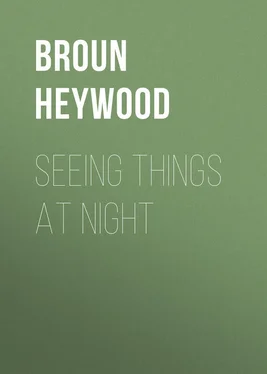Heywood Broun - Seeing Things at Night
Здесь есть возможность читать онлайн «Heywood Broun - Seeing Things at Night» — ознакомительный отрывок электронной книги совершенно бесплатно, а после прочтения отрывка купить полную версию. В некоторых случаях можно слушать аудио, скачать через торрент в формате fb2 и присутствует краткое содержание. ISBN: , Жанр: foreign_antique, foreign_prose, foreign_language, на английском языке. Описание произведения, (предисловие) а так же отзывы посетителей доступны на портале библиотеки ЛибКат.
- Название:Seeing Things at Night
- Автор:
- Жанр:
- Год:неизвестен
- ISBN:http://www.gutenberg.org/ebooks/35793
- Рейтинг книги:4 / 5. Голосов: 1
-
Избранное:Добавить в избранное
- Отзывы:
-
Ваша оценка:
- 80
- 1
- 2
- 3
- 4
- 5
Seeing Things at Night: краткое содержание, описание и аннотация
Предлагаем к чтению аннотацию, описание, краткое содержание или предисловие (зависит от того, что написал сам автор книги «Seeing Things at Night»). Если вы не нашли необходимую информацию о книге — напишите в комментариях, мы постараемся отыскать её.
Seeing Things at Night — читать онлайн ознакомительный отрывок
Ниже представлен текст книги, разбитый по страницам. Система сохранения места последней прочитанной страницы, позволяет с удобством читать онлайн бесплатно книгу «Seeing Things at Night», без необходимости каждый раз заново искать на чём Вы остановились. Поставьте закладку, и сможете в любой момент перейти на страницу, на которой закончили чтение.
Интервал:
Закладка:
Seeing Things at Night
Introduction
THE first difficulty was the title. It was felt that Seeing Things at Night might suggest theatrical essays to the exclusion of anything else. That was not the author's intention. He meant to suggest rather newspaper articles of any sort done more or less on the spur of the moment for next day's consumption. There was also some question as to the order in which the various "pieces" should be arranged. The author was tempted to follow the example of Adolf Wolff, a free verse poet who published a volume some years ago called Songs, Sighs and Curses , and explained in a foreword, "When asked in what sequence he would arrange his poems, Wolff threw the manuscripts in the air, saying 'Let Fate decide.' They now appear in the order in which they were picked up from the floor."
Broun, however, feared that some of his essays might crash through the floor like the mistakes of a cannonball juggler and that others would prove so lacking in weight when put to the test that it would be necessary to pluck them from the ceiling rather than the floor. The arrangement, therefore, is premeditated though haphazard. In respect to his age the author also wishes to explain that the character, H. 3rd, who appears from time to time is his son and not his grandson. He also wishes to acknowledge the courtesy of The New York Tribune , Vanity Fair , McCall's , Collier's Weekly and The Nation in permitting him to reprint various articles which first appeared in their pages.
The Fifty-first Dragon
Of all the pupils at the knight school Gawaine le Cœur-Hardy was among the least promising. He was tall and sturdy, but his instructors soon discovered that he lacked spirit. He would hide in the woods when the jousting class was called, although his companions and members of the faculty sought to appeal to his better nature by shouting to him to come out and break his neck like a man. Even when they told him that the lances were padded, the horses no more than ponies and the field unusually soft for late autumn, Gawaine refused to grow enthusiastic. The Headmaster and the Assistant Professor of Pleasaunce were discussing the case one spring afternoon and the Assistant Professor could see no remedy but expulsion.
"No," said the Headmaster, as he looked out at the purple hills which ringed the school, "I think I'll train him to slay dragons."
"He might be killed," objected the Assistant Professor.
"So he might," replied the Headmaster brightly, but he added, more soberly, "We must consider the greater good. We are responsible for the formation of this lad's character."
"Are the dragons particularly bad this year?" interrupted the Assistant Professor. This was characteristic. He always seemed restive when the head of the school began to talk ethics and the ideals of the institution.
"I've never known them worse," replied the Headmaster. "Up in the hills to the south last week they killed a number of peasants, two cows and a prize pig. And if this dry spell holds there's no telling when they may start a forest fire simply by breathing around indiscriminately."
"Would any refund on the tuition fee be necessary in case of an accident to young Cœur-Hardy?"
"No," the principal answered, judicially, "that's all covered in the contract. But as a matter of fact he won't be killed. Before I send him up in the hills I'm going to give him a magic word."
"That's a good idea," said the Professor. "Sometimes they work wonders."
From that day on Gawaine specialized in dragons. His course included both theory and practice. In the morning there were long lectures on the history, anatomy, manners and customs of dragons. Gawaine did not distinguish himself in these studies. He had a marvelously versatile gift for forgetting things. In the afternoon he showed to better advantage, for then he would go down to the South Meadow and practise with a battle-ax. In this exercise he was truly impressive, for he had enormous strength as well as speed and grace. He even developed a deceptive display of ferocity. Old alumni say that it was a thrilling sight to see Gawaine charging across the field toward the dummy paper dragon which had been set up for his practice. As he ran he would brandish his ax and shout "A murrain on thee!" or some other vivid bit of campus slang. It never took him more than one stroke to behead the dummy dragon.
Gradually his task was made more difficult. Paper gave way to papier-mâché and finally to wood, but even the toughest of these dummy dragons had no terrors for Gawaine. One sweep of the ax always did the business. There were those who said that when the practice was protracted until dusk and the dragons threw long, fantastic shadows across the meadow Gawaine did not charge so impetuously nor shout so loudly. It is possible there was malice in this charge. At any rate, the Headmaster decided by the end of June that it was time for the test. Only the night before a dragon had come close to the school grounds and had eaten some of the lettuce from the garden. The faculty decided that Gawaine was ready. They gave him a diploma and a new battle-ax and the Headmaster summoned him to a private conference.
"Sit down," said the Headmaster. "Have a cigarette."
Gawaine hesitated.
"Oh, I know it's against the rules," said the Headmaster. "But after all, you have received your preliminary degree. You are no longer a boy. You are a man. To-morrow you will go out into the world, the great world of achievement."
Gawaine took a cigarette. The Headmaster offered him a match, but he produced one of his own and began to puff away with a dexterity which quite amazed the principal.
"Here you have learned the theories of life," continued the Headmaster, resuming the thread of his discourse, "but after all, life is not a matter of theories. Life is a matter of facts. It calls on the young and the old alike to face these facts, even though they are hard and sometimes unpleasant. Your problem, for example, is to slay dragons."
"They say that those dragons down in the south wood are five hundred feet long," ventured Gawaine, timorously.
"Stuff and nonsense!" said the Headmaster. "The curate saw one last week from the top of Arthur's Hill. The dragon was sunning himself down in the valley. The curate didn't have an opportunity to look at him very long because he felt it was his duty to hurry back to make a report to me. He said the monster, or shall I say, the big lizard? – wasn't an inch over two hundred feet. But the size has nothing at all to do with it. You'll find the big ones even easier than the little ones. They're far slower on their feet and less aggressive, I'm told. Besides, before you go I'm going to equip you in such fashion that you need have no fear of all the dragons in the world."
"I'd like an enchanted cap," said Gawaine.
"What's that?" answered the Headmaster, testily.
"A cap to make me disappear," explained Gawaine.
The Headmaster laughed indulgently. "You mustn't believe all those old wives' stories," he said. "There isn't any such thing. A cap to make you disappear, indeed! What would you do with it? You haven't even appeared yet. Why, my boy, you could walk from here to London, and nobody would so much as look at you. You're nobody. You couldn't be more invisible than that."
Gawaine seemed dangerously close to a relapse into his old habit of whimpering. The Headmaster reassured him: "Don't worry; I'll give you something much better than an enchanted cap. I'm going to give you a magic word. All you have to do is to repeat this magic charm once and no dragon can possibly harm a hair of your head. You can cut off his head at your leisure."
He took a heavy book from the shelf behind his desk and began to run through it. "Sometimes," he said, "the charm is a whole phrase or even a sentence. I might, for instance, give you 'To make the' – No, that might not do. I think a single word would be best for dragons."
Читать дальшеИнтервал:
Закладка:
Похожие книги на «Seeing Things at Night»
Представляем Вашему вниманию похожие книги на «Seeing Things at Night» списком для выбора. Мы отобрали схожую по названию и смыслу литературу в надежде предоставить читателям больше вариантов отыскать новые, интересные, ещё непрочитанные произведения.
Обсуждение, отзывы о книге «Seeing Things at Night» и просто собственные мнения читателей. Оставьте ваши комментарии, напишите, что Вы думаете о произведении, его смысле или главных героях. Укажите что конкретно понравилось, а что нет, и почему Вы так считаете.












